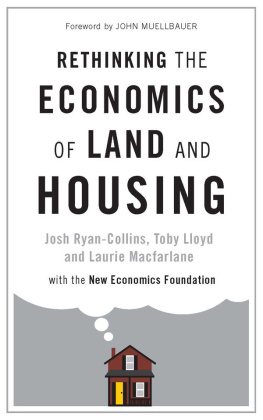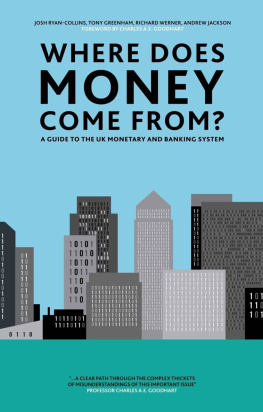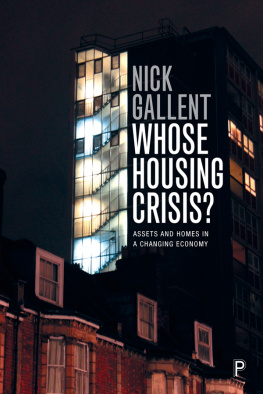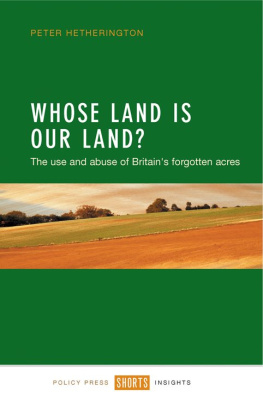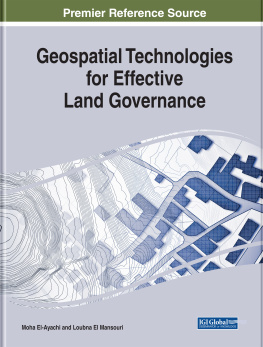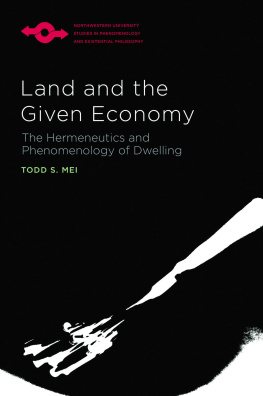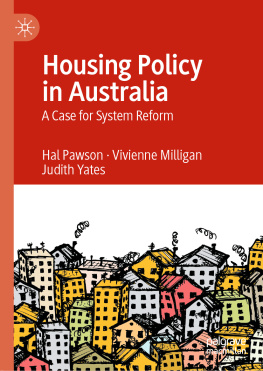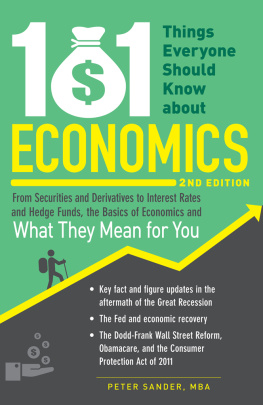A comprehensive survey of the role of land in the economy and its neglect in economics, as well as a profile of how ownership of this essential requirement for life has become unattainable for the majority of young Britons, thanks to the march of finance and the compliance of Parliament.
Steve Keen, author of Debunking Economics
Land policy is the missing issue in any discussion on planning, development and the property market. This book is therefore long overdue. It returns land to its central role in both economic theory and in built environment discourses.
Duncan Bowie, author of Radical
Solutions to the Housing Supply Crisis
Dr Josh Ryan-Collins is senior economist at the New Economics Foundation, where he has been based since 2006. He leads a research programme at NEF focusing on monetary and financial reform and the economics of land and housing and has published widely across these areas. Josh is the lead author of Where Does Money Come From? , a comprehensive guide to the workings of the modern monetary system, which is used as a textbook to teach banking and finance courses at universities in the UK and United States. He has a PhD in economics from the University of Southampton and is visiting research fellow at Southampton Business School and City Universitys Political Economy Research Centre in London.
Toby Lloyd is head of housing development at Shelter, the UKs largest housing charity, where he was previously head of policy. He has worked on housing issues across the public, private and voluntary sectors for over twelve years, advising ministers, mayors, businesses and communities. His proposal for a new Garden City won the runner-up award in the Wolfson Economics Prize 2014.
Laurie Macfarlane is an economist at the New Economics Foundation, working on land and financial reform issues. He was previously head of economic analysis at the Water Industry Commission for Scotland and also spent one year working in the markets and economics division at Ofwat. Laurie has written on land and housing reform for the progressive Scottish think tank Common Weal. He has a first class degree in economics from the University of Strathclyde.
The New Economics Foundation is the only people-powered think tank. It works to build a new economy where people really take control.
RETHINKING THE
ECONOMICS
OF LAND AND
HOUSING
Josh Ryan-Collins, Toby Lloyd and Laurie Macfarlane
Foreword by John Muellbauer

Rethinking the Economics of Land and Housing was first published in 2017 by Zed Books Ltd, The Foundry, 17 Oval Way, London SE11 5RR, UK
www.zedbooks.net
Copyright Josh Ryan-Collins, Toby Lloyd and Laurie Macfarlane 2017
The rights of Josh Ryan-Collins, Toby Lloyd and Laurie Macfarlane to be identified as the author of this work have been asserted by them in accordance with the Copyright, Designs and Patents Act, 1988
Typeset in Sabon by seagulls.net
Index: Rohan Bolton
Cover design: and illustration by David A. Gee
All rights reserved. No part of this publication may be reproduced, stored in a retrieval system or transmitted in any form or by any means, electronic, mechanical, photocopying or otherwise, without the prior permission of Zed Books Ltd.
A catalogue record for this book is available from the British Library
ISBN 978-1-78699-119-5 hb
ISBN 978-1-78699-118-8 pb
ISBN 978-1-78699-120-1 pdf
ISBN 978-1-78699-121-8 epub
ISBN 978-1-78699-122-5 mobi
CONTENTS
FIGURES, TABLES AND BOXES
Figures
Tables
Boxes
ACKNOWLEDGEMENTS
The authors are most grateful to the following individuals for reviewing initial drafts and chapters of the book and providing invaluable suggestions: John Muellbauer, Kate Barker, Alison Wallace, Howard Reed, James Bruges, Allana Yurko, Steve Keen, Michael Kumhof, Nicholas Tideman, Ken Gibb, Bob Colenutt, Duncan Bowie, Paul Gilbert and Giorgos Galanis.
Thanks to Duncan McCann, Alice Martin and Beth Stratford for intellectual and practical support in getting the book written. The book has also benefited from the insights of participants at a roundtable on the financialisation of housing held at the Bank of England in July 2016.
Josh and Toby would like to thank their respective families for their considerable patience in the writing up process. Thanks also to Ken Barlow and colleagues at Zed for their support in bringing the book to publication.
Finally, thanks to the RH Southern Trust and James and the late Marion Bruges for their financial support for this project. Sadly Marion passed away before this book was completed we dedicate it to her memory.
ABBREVIATIONS
ARLA | Association of Residential Letting Agents |
BSA | Building Societies Association |
BTL | buy-to-let |
CAP | Common Agricultural Policy |
CLT | community land trust |
CMU | Capital Markets Union |
CPI | consumer price inflation |
CRE | commercial real estate |
FPC | Financial Policy Committee |
GDP | gross domestic product |
HEW | home equity withdrawal |
IHT | inheritance tax |
IMF | International Monetary Fund |
ISA | Individual Savings Account |
LBTT | land and buildings transaction tax |
LTI | loan-to-income (ratio) |
LTV | loan-to-value (ratio) |
LVT | land value tax |
MBS | mortgage-backed security |
MIRAS | mortgage interest relief at source |
NIMBY | not-in-my-back-yard |
OECD | Organisation for Economic Co-operation and Development |
OPEC | Organization of the Petroleum Exporting Countries |
QE | quantitative easing |
RMBS | residential mortgage-backed security |
SDLT | stamp duty land tax |
SMEs | small and medium sized enterprises |
SPV | special purpose vehicle |
GLOSSARY
Bank capital Bank capital can be considered as a banks own funds. For banks, capital mainly consists of common shares (also known as common equity) and retained earnings which can easily absorb losses and therefore protect them from insolvency. Taken together, these own funds are equivalent to the difference between the value of total assets and liabilities.
Buy-to-let When a property is purchased with the specific intention of being let out to tenants. A buy-to-let mortgage is a mortgage taken out by a landlord specifically designed for this purpose.
Capital gains tax A charge on gains realised due to the disposal of assets, calculated as the difference between the cost of acquiring the asset and the income acquired due to the disposal of that asset.
Collateral Something pledged as security for repayment of a loan. If the borrower fails, the bank covers its losses by repossessing the underlying asset the loan was raised against.
Credit creation Lending by deposit-taking banks, involving the creation of both an asset (the loan) and a simultaneous liability (the deposit), the latter adding to the money supply.
Next page
